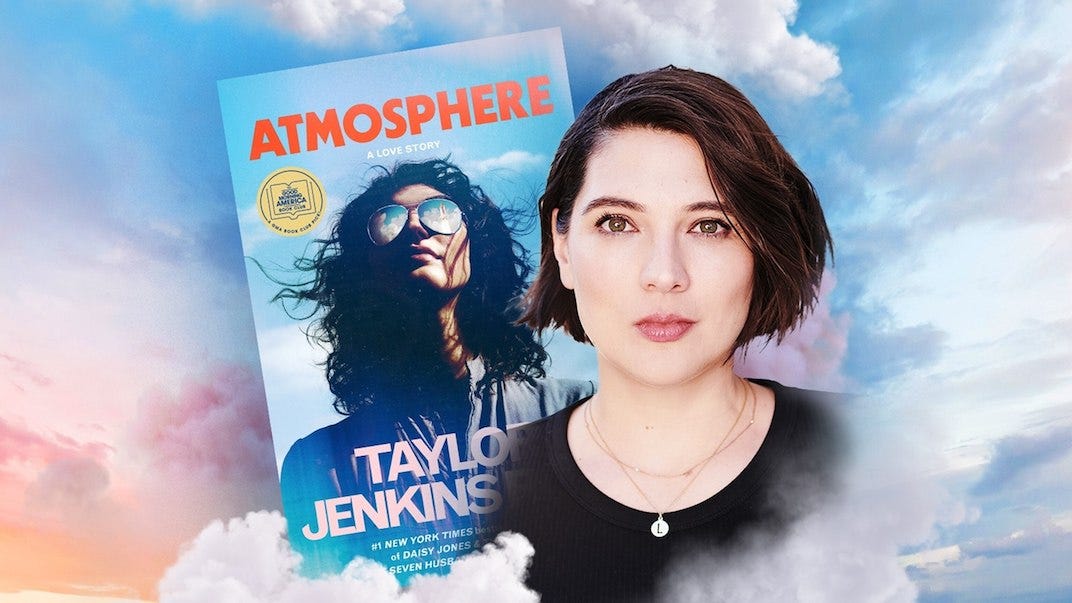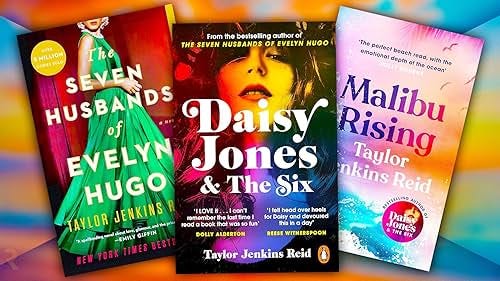Taylor Jenkins Reid's $40 million book deal is bad for writers
Her big payday for novels that are a Sweet Valley High for adults shows that publishing is a winner-take-all business

You might see no downside to the news that Taylor Jenkins Reid has landed a $40 million deal for five books from Simon & Schuster, which lured her away from Penguin Random House with the offer. James Patterson has a $150 million contract with Hachette. Doesn’t Reid’s big payday mean that female authors are catching up with men?
In your dreams. Twenty-five years ago, Mary Higgins Clark marked the 25th anniversary of the publication her first mystery, Where Are the Children?, with a $64 million deal from Simon & Schuster. Far from being good for women, the bonanza has turned out to be bad for writers across the board.
Along with the eye-watering sums paid to Stephen King, Clark’s megadeal helped lead to the dismal reality authors now face. In America book publishing has become a microcosm of the culture as a whole: It’s a hits-driven, winner-take-all affair. As the payouts to literary stars have gone through the roof, book advances for others have stagnated or declined.
It might be different if the high-rollers in publishing were doling out the fat sums to America’s best writers. But that’s seldom been the case. Philip Roth, who turned up regularly on lists of favorites for the Nobel Prize, was notorious for hopping among publishers—Random House, Simon & Schuster, and Houghton Mifflin among them—to earn what he thought he deserved.
Reid writes what the industry calls “women’s fiction,” and while her novels aren’t without merit, they’re far from the best being written by or for women. Or so I discovered when—after hearing of her $40 million deal—I hit the library in my Gulf Coast town, a place quiet enough that people call it Mayberry on the Bay. I was looking for her new Atmosphere, a tale of two female astronauts who fall in love while working for NASA on the space shuttle program in the 1980s.
It turned out that all but one of Reid’s nine novels were checked out, including the two often ranked as her best: The Seven Husbands of Evelyn Hugo and Daisy Jones and the Six. The library had only her seventh, Malibu Rising, which centers on four celebrated children of a famous singer who gather on a summer night in 1983 for a party hosted by supermodel sister Nina that will expose long-buried family secrets.
I could have added my name to the waiting list for Atmosphere or another of Reid’s novels. But I wanted to avoid the boondoggle I’d faced when I too optimistically put my name on a waiting list for one of Colleen Hoover’s novels despite an ominous warning from a librarian that hundreds of people were ahead of me. I ended up buying The Last of Us, anyway, when it hadn’t shown up after six months.
So I grabbed Malibu Rising off the shelf and took it home. I read it in a day, much less time than I’d had to spend on Rebecca Yarros’ romantasy doorstopper Onyx Storm, the fastest-selling adult novel in 20 years, which involves two dragon riders who have wince-inducing sex while trying defeat an evil force called venin.
Reid’s book inspires a ‘Sweet Valley High’ feeling
Jenna Bush Hager had chosen Malibu Rising for her Read With Jenna book club on Today, and in one respect, she had promoted it aptly. Reid’s books, she said, gave her “the same feeling that Sweet Valley High or The Babysitters Club did” when she was young and wanted to stay up all night reading them under the covers.
Hager’s words struck closer to the truth than much of what I’d read by my fellow critics. Malibu Rising resembled a Sweet Valley High novel for grownups, or a few notches above one. That’s not a flaw if you’ve read way too much Sally Rooney and crave something with fewer literary pretensions. We all need to shift into a lower mental gear at times, though my own tastes in series fiction run more to Donna Leon and P.G. Wodehouse.
The problem was that, unlike TV hosts who are clearly plugging their choices, critics typically write about so-called women’s fiction in ways that are confusing or make no sense. The treatment of Malibu Rising is a case in point. When the novel came out in 2021, the novelist Elinor Lipman rightly wrote in the New York Times Book Review:
“Reid’s dialogue wants to capture the tone of the young, the beautiful and athletic, but much of it feels lazy to the point of being cringe-worthy. The dialogue and interior monologue can be juvenile, filled with repeated expletives that can’t be quoted here, but wear thin and detract from the overall effect, rather than adding to the portrait of these characters, as Reid presumably intends.”
But the editors of the NYTBR appear to have changed their minds since then. Just last month, they ran an article by one of its editors that had capsule descriptions of all of Reid’s books. It said her novels have several “commonalities,” including “an ear for snappy conversation.”
What does “snappy conversation” mean at the NYTBR? The editor didn’t say. But here’s an example from Malibu Rising:
“You were born a piece of shit and you’ll die a piece of shit just like every other piece of shit on this planet!”
That line comes from Veronica, the second wife of the legendary crooner Mick Riva, who’s learned that he’s cheating on her after just four months of marriage.
But Veronica is a bit player. If you’d like a “snappy” line from a main character, try this from Mick’s supermodel daughter, Nina:
“Us Riva women have great boobs. I have great boobs. You have great boobs.”
Those lines point to another problem with Reid’s fiction: a cavalier approach to facts. After Mick splits from Veronica, he has his third marriage “annulled the next day.” That’s all but impossible. Religious annulments take months or more, and even civil annulments can take weeks.
As for those “great boobs” on Nina, I worked for years for Glamour, where I rode the elevator with models. They typically don’t have “great boobs,” they have no boobs. Standards for body types have become more flexible since 1983, the setting for Malibu Rising, but models still tend to be thin and flat-chested.
Reid can do better than all of this. Malibu Rising opens with a fine, brief set piece on Southern California fires, which fill the sky thick black with smoke and lead to “ash falling like snow.”
But deals like Reid’s can undermine authors’ efforts to improve. Why should they try to do better when publishers will pay them tens of millions of dollars for churning out more of the same?
Reid has said Malibu Rising is about “what parents owe their children.” The larger question raised by this novel is what authors owe their readers, and whether it isn’t more than they get from this one.
Jan Harayda is an award-winning critic and journalist who has been a staff writer for Glamour, the book editor of a large newspaper, and a vice president of the National Book Critics Circle.
Notes
https://time.com/7284944/taylor-jenkins-reid-atmosphere-
https://lithub.com/when-philip-roth-switched-publishers-drama-ensued/
https://contactanycelebrity.com/cac/jenna-bush-hager-favorite-books/
https://www.nytimes.com/article/taylor-jenkins-reid-books.html
https://www.nytimes.com/2021/05/29/books/review/malibu-rising-taylor-jenkins-reid.html
Want want save me a few trips to the library in this sweltering Gulf Coast humidity, known here as “air you can wear”? Please consider becoming a paid subscriber so I can download the next book at home. Thanks a million to the paid subscribers who may already have saved me from a few episodes of heat prostration.





Hollywood studios used to make movies like Taxi Driver, highly original, strange, disturbing. Now they make superhero movies. I'm a lifelong comics geek. I love superheroes. But I know the movies are just entertainments. I've read one book by TJR and one by Colleen Hoover. They're entertainments, easily replaced by the next entertainment. I have another analogy. In TV, there are shows like The Sopranos. Great works of art. And there are shows like 95% of what's streaming now. Most nights, when I feel like watching great drama, I rewatch episodes of shows like The Sopranos. The novel I'm currently reading? One Flew Over the Cuckoo's Nest, published in 1962.
As a writer myself, I whole-heartedly agree that this sum is grossly out of sync with the rest of the literary world, and it makes me a bit nauseous. It's very discouraging when the rest of us are begging for crumbs from the industry -- especially as that eye-watering sum also means she's going to have an equally eye-watering amount of money thrown at marketing, and again... some of us would be thrilled with a tiny proportion of that. I also honestly worry about what it's going to do to her mental health and her writing -- a nice problem to have, sure, but it's also a lot of pressure.
I've been a fan of TJR since her first book Forever, Interrupted in 2013 (when nobody had heard of her) and I've loved most of her books. (We were Twitter friends, back when Twitter was still fun and she was still on it!) Malibu Rising is far from her best -- I absolutely loved both Daisy Jones and Evelyn Hugo. Daisy Jones in particular is notable for how deftly she uses a structure that in lesser hands could have fallen flat.
So, I'm not going to say "you must read them" or anything like that -- each to their own, and you should read what you want to, and there are some underrated gems out there that are just as if not more deserving of the hype than these admittedly over-exposed books -- but if my first read by her had been Malibu Rising, I might not have been overly impressed either. I liked it! It went down easily. But it was ultimately enjoyable but forgettable. I can't say the same about some of her other books, which truly blew me away.